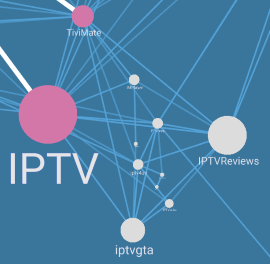 In the absence of sudden momentous events, shaping entrenched public opinion requires astute calculations and considerable patience, built on a foundation of financial power.
In the absence of sudden momentous events, shaping entrenched public opinion requires astute calculations and considerable patience, built on a foundation of financial power.
Right now and most likely for the foreseeable future, the corporations behind the BeStreamWise anti-piracy campaign believe that given enough time, attitudes towards pirate IPTV devices can be shaped in favor of legal alternatives.
The main strategy observed to date aims to increase sensitivity to risk by constantly associating piracy with crimes against the individual; malware-infested devices stealing banking details, IPTV operators’ involvement in wider, exponentially more serious crime, and messaging that portrays subscription payments fueling that criminality, whatever it might be.
Sensational Can Work, Unbelievable Does Not
The final piece of the jigsaw uses practical actions in the physical world to show that IPTV operators and their customers face a genuine risk of legal action. Nurturing perceptions that prosecutions are both real and expanding are nothing new to the anti-piracy scene yet continue to face significant challenges.
In January, amplification led to widespread belief that police were visiting the homes of 1,000 Premier League pirates. Not only was that untrue but the end result was a doubled-edged sword. On one hand, huge numbers of people were exposed to a ‘new reality’ of heightened, imminent risk. On the other, the numbers were simply too big to survive a cheap calculator and common sense.

That no obvious effort was expended to correct the reports wasn’t a surprise from a commercial perspective. However, given the direct involvement of the police, tackling misinformation arguably forms part of the service.
Interestingly, it now transpires that police forces around the UK were under instruction to remain silent on specific details of the operation. Before we address that, here’s some fresh news for context.
FACT and Sky Target IPTV Service Providers
In a press release Monday, FACT and Sky announced details of a new operation conducted with support from regional police forces in the UK. After identifying “almost 50 illegal IPTV service providers” offering live TV and movies, the operators were issued with legal warnings “delivered in person, by post, and by email.”
The ‘cease-and-desist’ notices instruct those running the services to immediately stop their illegal streaming activity otherwise risk facing criminal prosecution. Addresses across the UK were visited in person, from London, Dorset, Cambridgeshire, West Midlands, North Midlands, West Yorkshire, Greater Manchester and to one address in Scotland.
FACT and Sky went on to clarify that exactly 47 legal notices were issued and that led to the majority of the illegal services being taken down. Such specifics are increasingly rare but welcome nonetheless; details expressed in non-ambiguous language build confidence and trust in the message being delivered, a plus for the overall goal.
Under pressure to tackle what is clearly a major problem for rightsholders, similar press releases worldwide trend towards vague language vulnerable to misinterpretation and reporting that portrays events as bigger, more dramatic, and ultimately more consequential than they really are. That can be a welcome bonus, but not always.
Metropolitan Police: “Don’t Disclose Details on Numbers of Visits”
The misinterpreted “1,000 homes” claim that exploded from news of a similar cease-and-desist campaign in January is now all but the truth according to Google’s search results. Whether early outreach to the media could have prevented the spread of misinformation is unknown, but it appears that police were under specific instruction not to discuss the scale of the operation.
Evidence appears in a document published by the Greater London Authority’s London Assembly, a 25-member elected body that scrutinizes the work of the Mayor and Mayoral advisers and holds them to account.
In February 2023, politician Susan Hall, a councillor on Harrow London Borough Council and then leader of the London Conservatives on the London Assembly, sought information from the Mayor on the “1,000 homes” operation. The question itself shows that even those with direct access to powerful political leaders are susceptible to misinformation.
“It was recently reported that the police are set to visit 1,000 homes to talk about their use of illegal online streams. How many of these visits will be/have been in London?” the question reads.
The official response, reproduced verbatim below, confirms that 1,000 homes were not visited. More importantly, it reveals that London’s Metropolitan Police asked forces around the UK not to disclose details on the number of visits carried out.
Date: Friday 10 March 2023
Between 9th – 24th January 2023, Operation Raider Plus, a national campaign to protect the public from harm online, led by the Federation Against Copyright Theft (FACT) and supported by the City of London Police’s Police Intellectual Property Crime Unit (PIPCU), the Government Agency Intelligence Network (GAIN) and West Mercia Police, identified over 1,000 subscribers to illegal sports streaming services.
These individuals either received an in-person visit or were sent a cease-and-desist letter. Officers from the Metropolitan Police Services (MPS) accompanied FACT on visits in London, warning individuals of the consequences of cybercrime, which include funding criminal organizations and exposing themselves to fraud, scams, inappropriate content, viruses and malware.
FACT have asked forces not to disclose details on the number of visits made and letters sent, so as not to reduce any deterrent effect, and the MPS would ask that this position be respected.
On an ordinary level, deterrent effects are both valuable and worthy of protection, but this is no ordinary case.
While the campaign itself tackles a specific type of crime, first and foremost it’s described as “a national campaign to protect the public from harm online.” Nowhere is it mentioned that this and similar operations are initiated on behalf of rightsholders with the primary aim of reducing piracy and increasing sales.
Public/private partnerships like these are being promoted as the future of anti-piracy enforcement worldwide.
From: TF, for the latest news on copyright battles, piracy and more.


0 Commentaires